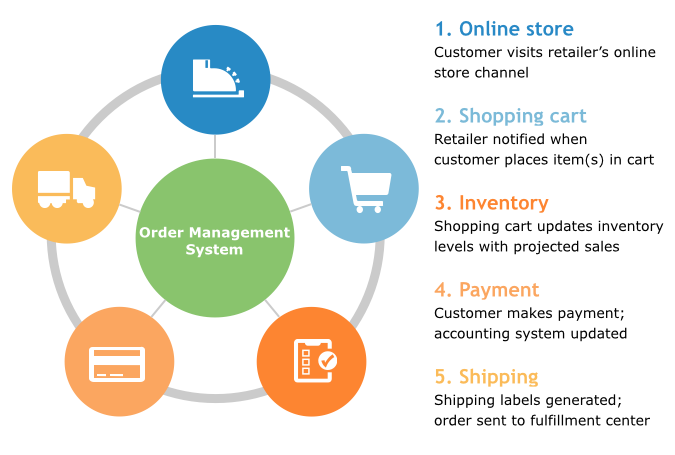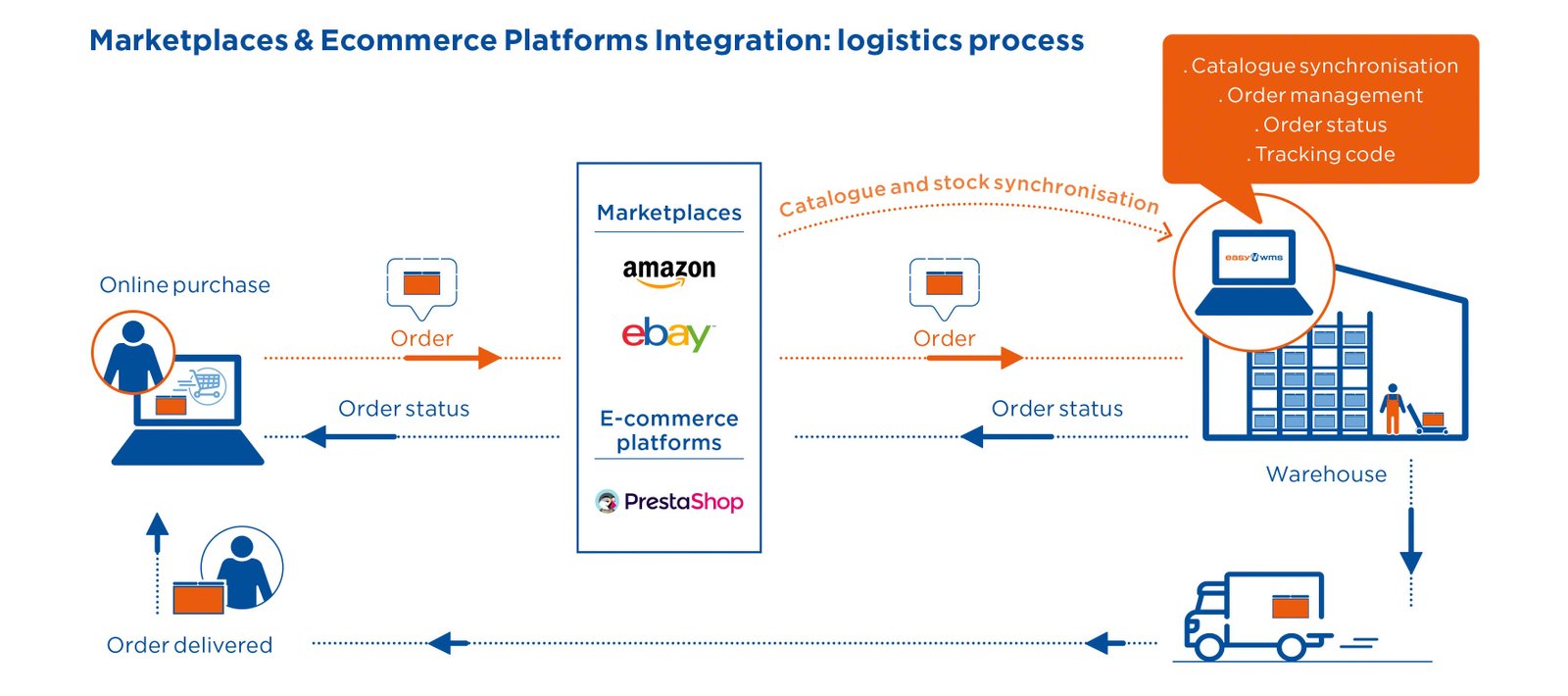
If you’re in the world of e-commerce, you know that running a successful online business involves more than just setting up a website and listing products. It’s all about creating a seamless and efficient online sales operation. And one key aspect of this is integrating your e-commerce platform with order fulfillment and shipping systems. By doing so, you can streamline your processes, improve customer satisfaction, and ultimately boost your online sales. So, let’s dive into the world of integrating e-commerce platforms with order fulfillment and shipping systems for efficient online sales operations.
In today’s digital age, customers expect speed, convenience, and reliability when it comes to online shopping. And as an e-commerce business owner, it’s crucial to meet these expectations. That’s where integrating your e-commerce platform with order fulfillment and shipping systems comes into play. By seamlessly connecting these systems, you can automate various tasks such as order processing, inventory management, and shipping label generation. This not only saves you time and effort but also ensures accurate and timely order fulfillment. Plus, it allows you to provide your customers with real-time tracking information, so they can keep an eye on their packages every step of the way. With this integration, you can create a smooth and efficient online sales operation that keeps your customers happy and coming back for more. So, let’s explore the benefits, challenges, and best practices of integrating e-commerce platforms with order fulfillment and shipping systems.
Integrating e-commerce platforms with order fulfillment and shipping systems is crucial for efficient online sales operations. By seamlessly connecting these systems, businesses can automate processes, reduce errors, and improve customer satisfaction. With the right integration solution, orders can be automatically synced from the e-commerce platform to the order fulfillment system, allowing for real-time inventory updates and streamlined shipping. This integration also enables businesses to track shipments, provide accurate delivery estimates, and offer order tracking to customers. Overall, integrating e-commerce platforms with order fulfillment and shipping systems enhances operational efficiency and boosts online sales.

Integrating E-commerce Platforms with Order Fulfillment and Shipping Systems for Efficient Online Sales Operations
In today’s digital age, e-commerce has become a vital component of many businesses, allowing them to reach a wider audience and increase sales. However, managing online sales operations can be challenging, especially when it comes to order fulfillment and shipping. To streamline these processes and ensure efficient operations, integrating e-commerce platforms with order fulfillment and shipping systems is essential. This article will explore the benefits, tips, and best practices for integrating e-commerce platforms with order fulfillment and shipping systems for efficient online sales operations.
The Importance of Integration
Integrating e-commerce platforms with order fulfillment and shipping systems offers numerous advantages for businesses. One of the key benefits is improved efficiency. By automating the order fulfillment and shipping processes, businesses can save time and reduce the risk of errors. Integration allows for real-time updates on inventory levels, order status, and tracking information, ensuring seamless operations and enhanced customer satisfaction.
Furthermore, integration enables businesses to streamline their operations by centralizing data. With all the relevant information in one system, it becomes easier to manage inventory, track orders, and analyze sales data. This comprehensive view of the business allows for better decision-making and the ability to identify areas for improvement.
Choosing the Right E-commerce Platform
When it comes to integrating e-commerce platforms with order fulfillment and shipping systems, choosing the right e-commerce platform is crucial. There are numerous options available, each with its own features and capabilities. It’s essential to consider factors such as scalability, compatibility with existing systems, and ease of integration.
Some popular e-commerce platforms that offer seamless integration with order fulfillment and shipping systems include Shopify, WooCommerce, and BigCommerce. These platforms provide comprehensive APIs and plugins that allow businesses to connect their e-commerce stores with their preferred order fulfillment and shipping systems.
Benefits of Integrating E-commerce Platforms with Order Fulfillment and Shipping Systems
There are several benefits to integrating e-commerce platforms with order fulfillment and shipping systems:
- Efficiency: Integration automates the order fulfillment and shipping processes, saving time and reducing errors.
- Real-time Updates: Businesses can provide customers with real-time updates on inventory levels, order status, and tracking information.
- Centralized Data: Integration allows for a comprehensive view of the business, making it easier to manage inventory, track orders, and analyze sales data.
- Improved Customer Satisfaction: Seamless operations and timely order fulfillment lead to enhanced customer satisfaction.
- Scalability: Integration enables businesses to scale their operations efficiently as they grow.

Tips for Successful Integration
While integrating e-commerce platforms with order fulfillment and shipping systems offers numerous benefits, there are some tips to ensure successful integration:
- Research and Choose the Right Systems: Take the time to research and choose the order fulfillment and shipping systems that best meet your business needs. Look for systems that offer robust integration capabilities and excellent customer support.
- Test and Optimize: Before fully implementing the integration, conduct thorough testing to ensure everything is working smoothly. Monitor the integration regularly and optimize as needed.
- Train Your Team: Provide training to your team on how to use the integrated systems effectively. This will ensure a smooth transition and maximize the benefits of integration.
- Monitor Performance: Continuously monitor the performance of the integrated systems to identify any issues or areas for improvement. Regularly review analytics and customer feedback to make data-driven decisions.
- Stay Updated: Keep up to date with the latest updates and developments in e-commerce platforms and order fulfillment and shipping systems. This will allow you to take advantage of new features and enhancements.
Conclusion
Integrating e-commerce platforms with order fulfillment and shipping systems is essential for efficient online sales operations. It offers numerous benefits, including improved efficiency, real-time updates, centralized data, and enhanced customer satisfaction. By choosing the right e-commerce platform, following best practices, and continuously monitoring performance, businesses can streamline their operations and achieve success in the competitive e-commerce landscape.
Key Takeaways: Integrating E-commerce Platforms with Order Fulfillment and Shipping Systems for Efficient Online Sales Operations
- Integrating e-commerce platforms with order fulfillment and shipping systems is crucial for efficient online sales operations.
- By connecting these systems, businesses can streamline their order processing and shipping workflows.
- This integration allows for real-time inventory updates, ensuring accurate product availability for customers.
- Automating order fulfillment and shipping processes reduces human errors and saves time for businesses.
- Efficient online sales operations lead to improved customer satisfaction and increased sales revenue.
Frequently Asked Questions
Integrating e-commerce platforms with order fulfillment and shipping systems is crucial for efficient online sales operations. Here are some common questions about this process:
Q1: What are the benefits of integrating e-commerce platforms with order fulfillment and shipping systems?
Integrating e-commerce platforms with order fulfillment and shipping systems offers several benefits. Firstly, it streamlines the entire sales process, automating order processing, inventory management, and shipping. This saves time and reduces the risk of errors. Additionally, it provides real-time visibility into inventory levels, enabling accurate stock management and preventing overselling. Lastly, integration allows for seamless communication between different systems, enhancing efficiency and customer satisfaction.
By integrating these systems, businesses can improve their online sales operations, optimize their supply chain, and provide a better shopping experience for customers.
Q2: How can I integrate my e-commerce platform with order fulfillment and shipping systems?
The process of integrating your e-commerce platform with order fulfillment and shipping systems can vary depending on the specific platforms and systems you are using. However, there are generally two approaches to integration: using pre-built integrations or custom development.
Many e-commerce platforms offer pre-built integrations with popular order fulfillment and shipping systems. These integrations often require minimal configuration and can be easily set up by following the provided instructions. Alternatively, if there is no pre-built integration available, you can opt for custom development. This involves working with developers or using integration tools to create a custom connection between your e-commerce platform and order fulfillment and shipping systems.

Q3: What order fulfillment and shipping systems are commonly integrated with e-commerce platforms?
There are several order fulfillment and shipping systems that are commonly integrated with e-commerce platforms. Some popular options include ShipStation, ShipBob, Fulfillment by Amazon (FBA), and Easyship. These systems provide a range of features such as order management, inventory tracking, label printing, and shipping carrier integration.
When choosing an order fulfillment and shipping system, it’s important to consider factors such as your business size, shipping volume, and specific requirements. Researching and comparing different systems can help you find the one that best suits your needs.
Q4: Can I integrate multiple e-commerce platforms with the same order fulfillment and shipping system?
Yes, it is possible to integrate multiple e-commerce platforms with the same order fulfillment and shipping system. This can be particularly beneficial for businesses that sell across different online marketplaces or have multiple online stores. By integrating all platforms with a single order fulfillment and shipping system, you can centralize your operations and have a unified view of your orders, inventory, and shipping processes.
However, it’s important to ensure that the order fulfillment and shipping system you choose supports integration with multiple e-commerce platforms. Not all systems have this capability, so it’s necessary to check the compatibility before making a decision.
Q5: What challenges can arise during the integration process?
While integrating e-commerce platforms with order fulfillment and shipping systems can greatly benefit your online sales operations, there can be some challenges along the way. One common challenge is the complexity of different systems and their compatibility with each other. It’s essential to ensure that the platforms and systems you are integrating are capable of seamless communication and data exchange.
Another challenge can be the initial setup and configuration of the integration. Depending on the complexity of your business processes, it may require technical expertise or assistance from developers. Additionally, data migration and mapping can be time-consuming and require careful planning to avoid any data loss or inconsistencies.
Despite these challenges, with proper planning, research, and support, the integration process can be successfully completed, leading to more efficient online sales operations.

Final Summary: Revolutionize Your Online Sales with Integrated E-commerce and Fulfillment Systems
In today’s fast-paced digital world, integrating e-commerce platforms with order fulfillment and shipping systems is crucial for efficient online sales operations. From streamlining the order fulfillment process to enhancing customer satisfaction, this integration offers a multitude of benefits for businesses. By seamlessly connecting your e-commerce platform with your order fulfillment and shipping systems, you can revolutionize your online sales and take your business to new heights.
By integrating these systems, you can automate and streamline various aspects of your online sales operations. This means that orders can be automatically processed, inventory can be accurately tracked, and shipping details can be seamlessly communicated between systems. This not only saves you time and effort but also reduces the risk of errors and delays. With a well-integrated system, you can focus on what really matters – growing your business and providing exceptional customer experiences.
Furthermore, integrating e-commerce platforms with order fulfillment and shipping systems enables you to provide real-time visibility and tracking information to your customers. This enhances transparency and builds trust, as customers can easily track their orders and stay updated on the status of their shipments. This level of transparency not only improves customer satisfaction but also reduces the number of customer inquiries and support tickets, freeing up valuable time for your team.
In conclusion, integrating e-commerce platforms with order fulfillment and shipping systems is a game-changer for online businesses. It brings efficiency, automation, and enhanced customer experiences to your online sales operations. By embracing this integration, you can stay ahead of the competition and deliver exceptional service that keeps your customers coming back for more. So, don’t miss out on the opportunity to revolutionize your online sales – integrate your systems and unlock the full potential of your e-commerce business today!


